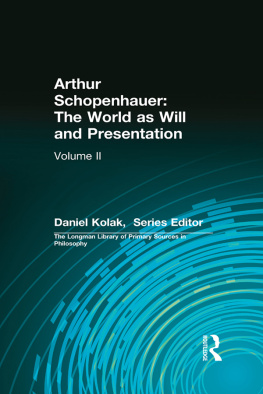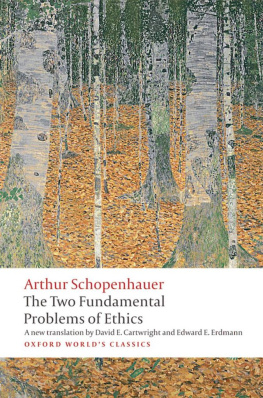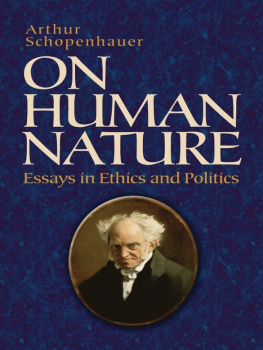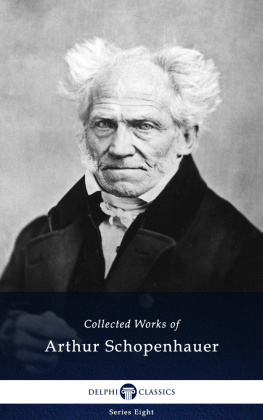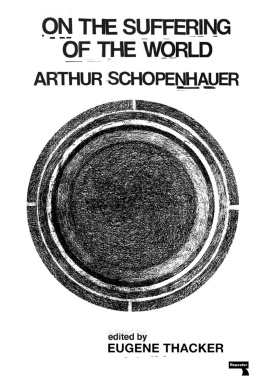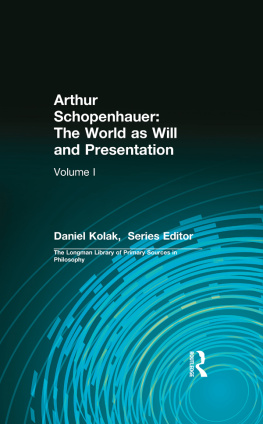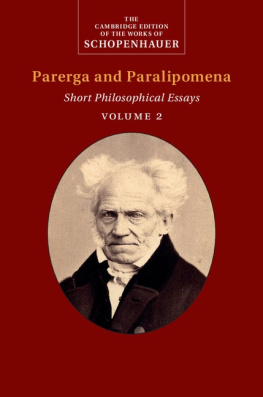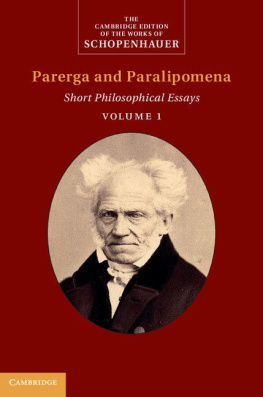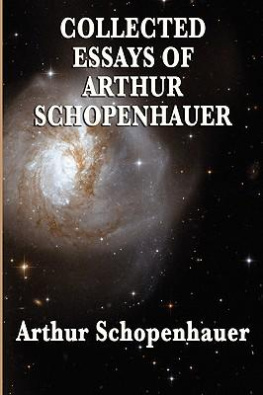Schopenhauer Arthur - Essays Art of Literature
Here you can read online Schopenhauer Arthur - Essays Art of Literature full text of the book (entire story) in english for free. Download pdf and epub, get meaning, cover and reviews about this ebook. genre: Science. Description of the work, (preface) as well as reviews are available. Best literature library LitArk.com created for fans of good reading and offers a wide selection of genres:
Romance novel
Science fiction
Adventure
Detective
Science
History
Home and family
Prose
Art
Politics
Computer
Non-fiction
Religion
Business
Children
Humor
Choose a favorite category and find really read worthwhile books. Enjoy immersion in the world of imagination, feel the emotions of the characters or learn something new for yourself, make an fascinating discovery.
- Book:Essays Art of Literature
- Author:
- Genre:
- Rating:4 / 5
- Favourites:Add to favourites
- Your mark:
- 80
- 1
- 2
- 3
- 4
- 5
Essays Art of Literature: summary, description and annotation
We offer to read an annotation, description, summary or preface (depends on what the author of the book "Essays Art of Literature" wrote himself). If you haven't found the necessary information about the book — write in the comments, we will try to find it.
Essays Art of Literature — read online for free the complete book (whole text) full work
Below is the text of the book, divided by pages. System saving the place of the last page read, allows you to conveniently read the book "Essays Art of Literature" online for free, without having to search again every time where you left off. Put a bookmark, and you can go to the page where you finished reading at any time.
Font size:
Interval:
Bookmark:
The Project Gutenberg EBook of The Art of Literature, by Arthur Schopenhauer
This eBook is for the use of anyone anywhere at no cost and withalmost no restrictions whatsoever. You may copy it, give it away orre-use it under the terms of the Project Gutenberg License includedwith this eBook or online at www.gutenberg.net
Title: The Art of Literature
Author: Arthur Schopenhauer
Release Date: January 14, 2004 [EBook #10714]
Language: English
*** START OF THIS PROJECT GUTENBERG EBOOK THE ART OF LITERATURE ***
Produced by Juliet Sutherland, Josephine Paolucci and the OnlineDistributed Proofreading Team.
The contents of this, as of the other volumes in the series, have beendrawn from Schopenhauer's Parerga, and amongst the various subjectsdealt with in that famous collection of essays, Literature holds animportant place. Nor can Schopenhauer's opinions fail to be of specialvalue when he treats of literary form and method. For, quite apartfrom his philosophical pretensions, he claims recognition as a greatwriter; he is, indeed, one of the best of the few really excellentprose-writers of whom Germany can boast. While he is thus particularlyqualified to speak of Literature as an Art, he has also something tosay upon those influences which, outside of his own merits, contributeso much to an author's success, and are so often undervalued when heobtains immediate popularity. Schopenhauer's own sore experiences inthe matter of reputation lend an interest to his remarks upon thatsubject, although it is too much to ask of human nature that he shouldapproach it in any dispassionate spirit.
In the following pages we have observations upon style by one whowas a stylist in the best sense of the word, not affected, nor yet aphrasemonger; on thinking for oneself by a philosopher who never didanything else; on criticism by a writer who suffered much from theinability of others to understand him; on reputation by a candidatewho, during the greater part of his life, deserved without obtainingit; and on genius by one who was incontestably of the privilegedorder himself. And whatever may be thought of some of his opinionson matters of detailon anonymity, for instance, or on the questionwhether good work is never done for moneythere can be no doubt thathis general view of literature, and the conditions under which itflourishes, is perfectly sound.
It might be thought, perhaps, that remarks which were meant to applyto the German language would have but little bearing upon one sodifferent from it as English. This would be a just objection ifSchopenhauer treated literature in a petty spirit, and confinedhimself to pedantic inquiries into matters of grammar and etymology,or mere niceties of phrase. But this is not so. He deals with hissubject broadly, and takes large and general views; nor can anyonewho knows anything of the philosopher suppose this to mean that he isvague and feeble. It is true that now and again in the course of theseessays he makes remarks which are obviously meant to apply to thefailings of certain writers of his own age and country; but in such acase I have generally given his sentences a turn, which, while keepingthem faithful to the spirit of the original, secures for them a lessrestricted range, and makes Schopenhauer a critic of similar faults inwhatever age or country they may appear. This has been done in spiteof a sharp word on page seventeen of this volume, addressed totranslators who dare to revise their author; but the change is onewith which not even Schopenhauer could quarrel.
It is thus a significant facta testimony to the depth of hisinsight and, in the main, the justice of his opinionsthat views ofliterature which appealed to his own immediate contemporaries, shouldbe found to hold good elsewhere and at a distance of fifty years.It means that what he had to say was worth saying; and since it isadapted thus equally to diverse times and audiences, it is probably ofpermanent interest.
The intelligent reader will observe that much of the charm ofSchopenhauer's writing comes from its strongly personal character, andthat here he has to do, not with a mere maker of books, but with aman who thinks for himself and has no false scruples in putting hismeaning plainly upon the page, or in unmasking sham wherever he findsit. This is nowhere so true as when he deals with literature; and justas in his treatment of life, he is no flatterer to men in general, sohere he is free and outspoken on the peculiar failings of authors. Atthe same time he gives them good advice. He is particularly happy inrecommending restraint in regard to reading the works of others, andthe cultivation of independent thought; and herein he recalls a sayingattributed to Hobbes, who was not less distinguished as a writer thanas a philosopher, to the effect that "if he had read as much as othermen, he should have been as ignorant as they."
Schopenhauer also utters a warning, which we shall do well to take toheart in these days, against mingling the pursuit of literature withvulgar aims. If we follow him here, we shall carefully distinguishbetween literature as an object of life and literature as a means ofliving, between the real love of truth and beauty, and that detestablefalse love which looks to the price it will fetch in the market. I amnot referring to those who, while they follow a useful and honorablecalling in bringing literature before the public, are content to beknown as men of business. If, by the help of some second witchof Endor, we could raise the ghost of Schopenhauer, it would beinteresting to hear his opinion of a certain kind of literaryenterprise which has come into vogue since his day, and now receivesan amount of attention very much beyond its due. We may hazard a guessat the direction his opinion would take. He would doubtless show ushow this enterprise, which is carried on by self-styled literarymen, ends by making literature into a form of merchandise, andtreating it as though it were so much goods to be bought and sold at aprofit, and most likely to produce quick returns if the maker's nameis well known. Nor would it be the ghost of the real Schopenhauerunless we heard a vigorous denunciation of men who claim a connectionwith literature by a servile flattery of successful livingauthorsthe dead cannot be made to payin the hope of appearing toadvantage in their reflected light and turning that advantage intomoney.
In order to present the contents of this book in a convenient form, Ihave not scrupled to make an arrangement with the chapters somewhatdifferent from that which exists in the original; so that two or moresubjects which are there dealt with successively in one and the samechapter, here stand by themselves. In consequence of this, some ofthe titles of the sections are not to be found in the original. I maystate, however, that the essays on Authorship and Style and thelatter part of that on Criticism are taken direct from the chapterheaded Ueber Schriftstellerei und Stil; and that the remainder ofthe essay on Criticism, with that of Reputation, is supplied bythe remarks Ueber Urtheil, Kritik, Beifall und Ruhm. The essays onThe Study of Latin, on Men of Learning, and on Some Formsof Literature, are taken chiefly from the four sections UeberGelehrsamkeit und Gelehrte, Ueber Sprache und Worte, Ueber Lesenund Bcher: Anhang
Next pageFont size:
Interval:
Bookmark:
Similar books «Essays Art of Literature»
Look at similar books to Essays Art of Literature. We have selected literature similar in name and meaning in the hope of providing readers with more options to find new, interesting, not yet read works.
Discussion, reviews of the book Essays Art of Literature and just readers' own opinions. Leave your comments, write what you think about the work, its meaning or the main characters. Specify what exactly you liked and what you didn't like, and why you think so.


